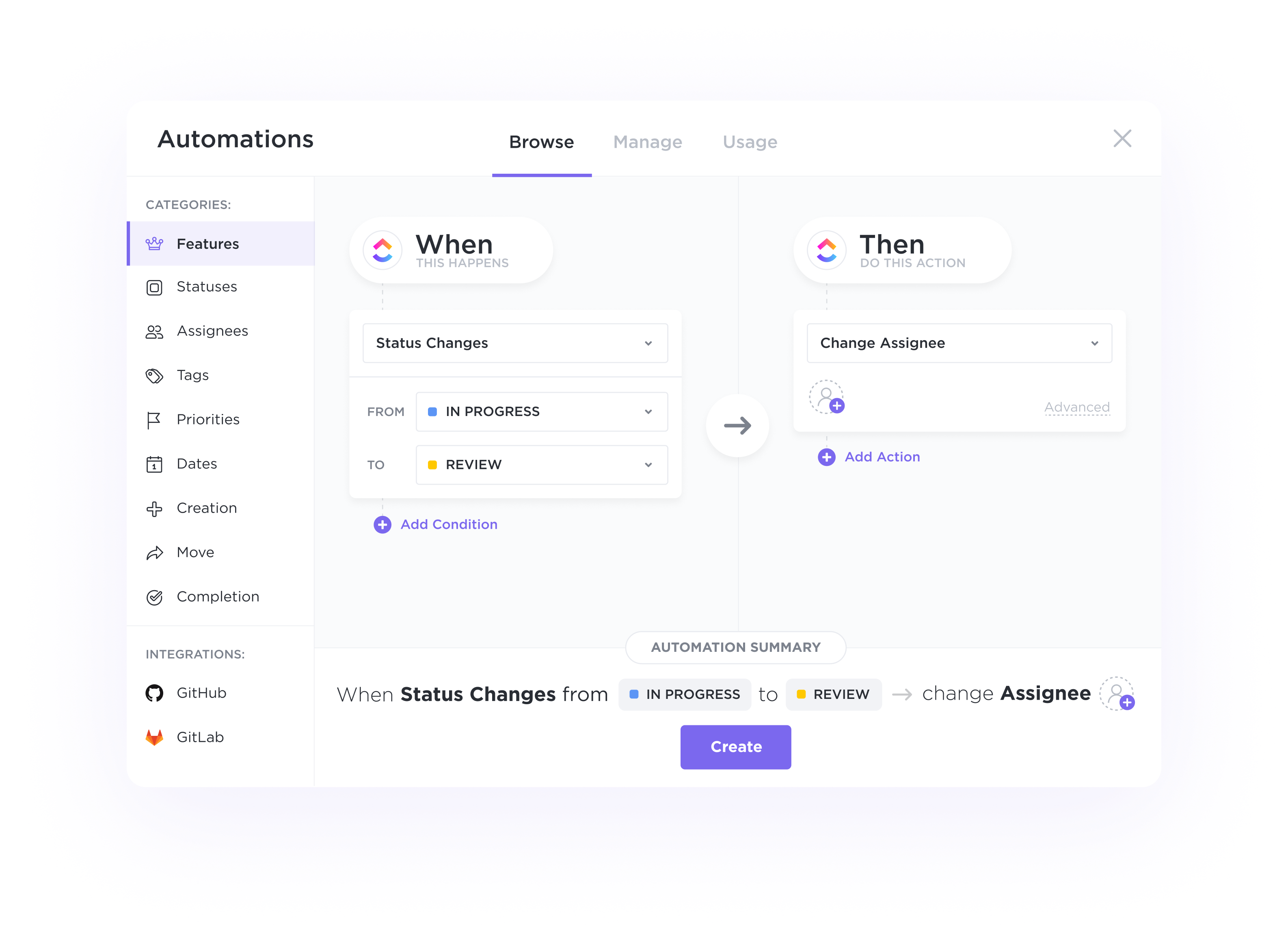Relationships
Build the perfect customer database.
Create your ideal system to store and analyze contacts, customers, and deals. Add links between tasks, documents, and more to easily track all your related work.

Gantt Charts
Empower your mechanical engineering team with a customized CRM system using ClickUp. Streamline your projects, track client interactions, and optimize your workflow all in one place. Boost productivity and enhance customer relationships with our tailored solution. Try ClickUp today and revolutionize how your team manages client communication.
Free forever. No credit card.
Relationships
Create your ideal system to store and analyze contacts, customers, and deals. Add links between tasks, documents, and more to easily track all your related work.

Automations
Automatically assign tasks for each stage of your pipeline, trigger status updates based on activity, and switch priorities to alert your team on where to focus next.

Collaboration Tools: Enable mechanical engineering teams to collaborate efficiently by sharing project documents, timelines, and tasks within the CRM platform. This fosters better communication and coordination among team members, leading to smoother project execution.
Project Tracking: Allows mechanical engineers to track project progress, monitor deadlines, and manage deliverables effectively. By using the CRM for project tracking, engineers can ensure that projects stay on schedule and within budget.
Centralized Database: Helps mechanical engineers maintain a centralized database of client and prospect information within the CRM. This ensures that all team members have access to up-to-date details about clients, improving customer relationship management and communication.
Interaction Tracking: Logs every interaction with clients, including calls, emails, and meetings, giving mechanical engineers a comprehensive view of the client journey. This helps in providing personalized services and building strong client relationships.
Process Standardization: Automates routine tasks and workflows for mechanical engineers, ensuring consistent processes across projects and teams. By standardizing processes through automation, engineers can increase efficiency and productivity in their daily operations.
Alerts and Notifications: Sends automated alerts for important tasks such as project milestones or client follow-ups, reducing the chances of missing critical activities. This feature helps mechanical engineers stay organized and on top of their responsibilities.
Customer Behavior Analysis: Allows mechanical engineers to track and analyze customer interactions with their services or products. By understanding customer behavior patterns, engineers can tailor their offerings to meet customer needs and preferences more effectively.
Performance Dashboards: Provides real-time data visualization tools for monitoring key business metrics in the CRM. Mechanical engineers can use performance dashboards to make informed decisions, identify trends, and optimize their strategies for better results.
Ticketing System: Enables mechanical engineers to manage customer inquiries and issues efficiently by assigning and tracking tickets within the CRM. This helps in ensuring timely resolution of customer concerns and maintaining high levels of customer satisfaction.
Customer Self-Service: Offers self-service options for clients to find solutions to common problems or FAQs, reducing the workload on engineering teams. By empowering customers to help themselves, mechanical engineers can focus on more complex tasks and projects.
A CRM system can help mechanical engineers centralize client information, project details, communication history, and key deadlines in one place. This ensures that all team members have access to up-to-date information, leading to better project management and client relationships.
CRMs can assist in tracking potential leads, opportunities, and bids in a structured manner. This feature helps mechanical engineers prioritize and follow up on potential projects, ensuring that no opportunity is overlooked or forgotten.
CRM software can facilitate the scheduling and management of tasks related to different projects. Mechanical engineers can set deadlines, assign tasks to team members, and track progress within the CRM, promoting better project organization and timely completion.
Enhanced communication features within a CRM system enable mechanical engineers to collaborate effectively with team members, clients, and external stakeholders. Real-time updates, file sharing, and comment threads streamline communication and ensure everyone is on the same page.
CRMs can serve as a repository for technical specifications, design iterations, and change requests throughout the project lifecycle. This documentation feature helps mechanical engineers keep track of design revisions, maintain version control, and ensure that all team members are working with the latest information.
CRM systems offer analytical tools that enable mechanical engineers to assess project performance, track key metrics, and identify areas for improvement. By analyzing data on project timelines, budget utilization, and resource allocation, engineers can optimize future projects for greater efficiency and success.
CRM software can help streamline project management for mechanical engineers by centralizing project-related information, facilitating communication and collaboration among team members, tracking project progress and deadlines, managing tasks and milestones, and providing insights for optimization and efficiency in project workflows.
CRM software in the mechanical engineering industry helps in managing customer relationships, tracking project progress, streamlining communication, and improving sales efficiency. It also enables better project management, enhances customer service, and boosts overall productivity.
CRM software can assist mechanical engineering firms in tracking and managing customer relationships by centralizing customer data, improving communication, enhancing project management, and providing insights for personalized interactions and targeted marketing efforts.